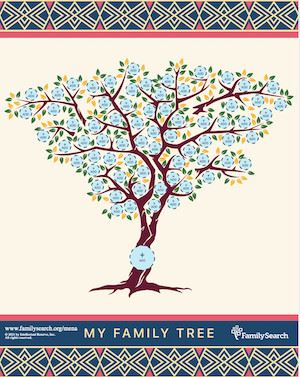Consumers love a sneak peek at the fun products and features planned for the upcoming year. Consumers in the expanding family history market are no different, and FamilySearch loves giving them something to enable more personal family connections. In 2022, FamilySearch will introduce a marriage of artificial intelligence and crowdsourcing that is sure to deliver millions of inspiring family discoveries for years to come.
FamilySearch Crowdsourcing
Hundreds of thousands of online volunteers have produced nearly 2 billion searchable online records since 2007 using FamilySearch crowdsourcing technology. The result of these efforts are highly searchable name indexes that enable anyone to instantly find information about an ancestor at FamilySearch.org.
The challenge of late has been how to create these searchable name indexes as fast as FamilySearch is digitizing the world’s historical family history records. Part of the answer is engaging more online volunteers. To do this, FamilySearch is offering new mobile technology and personalizing the experience so more volunteers can contribute in ways that are personally relevant to them.
“What if online volunteers could conveniently participate using their mobile phones? What if the records they help make more discoverable online were relevant to their personal family tree? What if meaningful contributions only took a few minutes to complete? What if the experience was in the volunteer’s native language? Those are some of the unique benefits of upcoming upgrades to the online volunteer experience. We are blurring the lines between volunteering and making personal family history discoveries,” said Ian James, a FamilySearch product manager.
This is the vision for the new online volunteer experience and integrated mobile app FamilySearch will unveil at RootsTech Connect 2022. FamilySearch believes these new experiences, expanding volunteer involvement globally, along with more technological capabilities under development, will exponentially increase access to the world’s historical records and enable millions more personal family discoveries.
Online volunteers have already made invaluable collections like the 1790 to 1940 US Censuses freely searchable online. Imagine what they will do with projects like the 1950 US Census and many more historical records collections from patrons’ homelands using FamilySearch’s new online volunteer experiences!
FamilySearch Artificial Intelligence
FamilySearch works with archives all over the world to help digitally preserve and expand online access to their genealogical records. In 2022, FamilySearch will be unveiling some exciting developments utilizing artificial intelligence and records access technology to make impressive additions to the number of searchable ancestor names found in those genealogical records at FamilySearch.org.
These emerging technologies will enable FamilySearch to make information hidden in its billions of digital images of historical records more discoverable—in a fraction of the time currently required.
“We’ve been implementing our new records access technologies in Spanish-speaking countries for the past year. We are very pleased with the results. We’ve been able to produce in one year what would have otherwise taken us a hundred years to do with previous technology. We are excited to unveil it at RootsTech 2022 along with our expansion plans,” said John Alexander, a FamilySearch product manager for the emerging technology.
Alexander said the new technology, coupled with the new online volunteer experiences and integration with a patron’s FamilySearch Family Tree, will dramatically increase personal discoveries and access to the world’s records.
FamilySearch Asian Pedigree Feature
A continual focus of FamilySearch is to help meet the needs of its growing base of international customers. In 2022 FamilySearch will deliver a new family tree visualization and documentation tool for its patrons with Asian ancestry. The Asian pedigree or “First Ancestor View” in the FamilySearch Family Tree will better reflect the record-keeping traditions and processes of Asian cultures that view their ancestors in a “top-down tree” perspective.
“Asia is an exciting segment for us,” said Mitch Wasden, a FamilySearch outreach manager. “We want to give people around the world the tools they need to help them to collaboratively create the ‘Family Tree of Humankind.’ This feature will give people with Asian ancestry a FamilySearch.org tree-building experience equal to those in other areas of the world.”
Africa and Middle East Family Tree Experience
 FamilySearch teams have been spending time in Africa and the Middle East getting to understand these cultures and their needs. For example, individual families in these regions may not be accustomed to documenting, visualizing, and sharing their family relations in the context of a “tree.” FamilySearch is delivering a new experience in 2022 tailored to patrons from Africa, North Africa, and the Middle East to artistically preserve and illustrate their family history in a variety of beautiful printable keepsakes. It will be offered through a mobile and web app that requires very little bandwidth or phone storage memory. Learn more, follow, and share the Family Tree initiative at FamilySearch.org/Africa and FamilySearch.org/MENA (Middle East and North Africa).
FamilySearch teams have been spending time in Africa and the Middle East getting to understand these cultures and their needs. For example, individual families in these regions may not be accustomed to documenting, visualizing, and sharing their family relations in the context of a “tree.” FamilySearch is delivering a new experience in 2022 tailored to patrons from Africa, North Africa, and the Middle East to artistically preserve and illustrate their family history in a variety of beautiful printable keepsakes. It will be offered through a mobile and web app that requires very little bandwidth or phone storage memory. Learn more, follow, and share the Family Tree initiative at FamilySearch.org/Africa and FamilySearch.org/MENA (Middle East and North Africa).
Discover your ancestors for free today at FamilySearch.org.
Register for RootsTech Connect 2022 (March 3–5) for free and be the first to learn more about these new FamilySearch features.
 Latest News Articles
Latest News Articles If you do not see a Plus Sign that is labeled "Add comment," you will need to upgrade to either a (FREE) Standard Edition or a (paid) Plus Edition subscription
If you do not see a Plus Sign that is labeled "Add comment," you will need to upgrade to either a (FREE) Standard Edition or a (paid) Plus Edition subscription